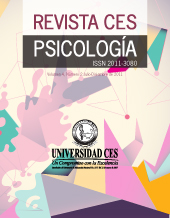Intervención grupal para díadas madre-infante privadas de libertad: efectos sobre la depresión materna y el desarrollo infantil
DOI:
https://doi.org/10.21615/cesp.13.3.13Palavras-chave:
Depresión Materna, Reclusión, Recintos Carcelarios, Desarrollo Socioemocional Infanti, Intervención GrupalResumo
La sintomatología depresiva es frecuente en las mujeres durante el período periparto, impacta negativamente el desarrollo infantil y puede mostrar un incremento cuando la maternidad se desarrolla en contextos carcelarios. Objetivo: realizar intervenciones grupales en dos grupos, uno conformado por mujeres embarazadas y otro por díadas madre-infante, que se encontraban cumpliendo condena en cárceles chilenas, y evaluar su efecto en la sintomatología depresiva materna y en el desarrollo socioemocional infantil. Método: Participaron 60 madres recluidas en recintos carcelarios chilenos, 30 embarazadas y 30 díadas (madres-infante). Se realizaron análisis de regresión multinivel para medidas repetidas de la sintomatología depresiva materna (BDI) en ambos grupos y del desarrollo socioemocional (ASQ-SE) en los niños/as participantes en la intervención para díadas. Resultados: se observó una reducción significativa de la sintomatología depresiva en las mujeres embarazadas (b=-3.60, t(29)=-2.66, p=.031) y en las madres con hijos/as nacidos (b=-0.1499, t(93)=-5.3, p=<.001), así como una reducción de las dificultades en el desarrollo socioemocional infantil (b=-15.26, t(18)=-4.107, p=.001). Conclusión: se discute la relevancia de contar con alternativas psicoterapéuticas para el abordaje de la depresión en madres privadas de libertad y la promoción de un desarrollo socioemocional saludable de sus hijos/as.
Downloads
Referências
Agnafors, S., Sydsjö, G., & Svedin, C. G. (2013). Symptoms of depression postpartum and 12 years later-associations to child mental health at 12 years of age. Maternal and Child Health Journal, 17, 405-414. https://doi:10.1007/s10995-012-0985-z
Barlow, J,. Bennett, C., Midgley, N., Larkin, S., & Wei, Y. (2015). Parent‐infant psychotherapy for improving parental and infant mental health. Cochrane Database of Systematic Reviews, 1 (CD010534). https://doi.org/10.1002/14651858.CD010534.pub2
Beck, A., Ward, C., Mendelson, M., Mock, J., & Erbaugh, J. (1961). An inventory for measuring depression. Archives of General Psychiatry, 4, 561-571. https://doi.org/10.1001/archpsyc.1961.01710120031004
Bowlby, J. (1988). Una base segura. Buenos Aires: Paidós.
Cooper, P., Murray, L., & Halligan, S. (2011). Tratamiento y depresión postparto. En Tremblay RE, Barr RG, Peters RDeV, & Boivin M., (eds.) Enciclopedia sobre Desarrollo de la Primera Infancia [en línea]. Montreal, Quebec: Centre of Excellence for Early Childhood Development, 1-6. Recuperado de http://www.child-encyclopedia.com/documents/Cooper-Murray-HalliganANGxp.pdf.
Birmingham, L., Coulson, D., Mullee, M., Kamal, M., & Gregoire, A. (2006). The mental health of women in prison mother and baby units. Journal of Forensic Psychiatry & Psychology, 17(3), 393–404. https://doi.org/10.1080/14789940600738442
Byrne, M., Goshin, L., & Joestl, S. (2010). Intergenerational transmission of attachment for infants raised in a prison nursery. Attachment and Human Development, 12(4), 375–393. https://doi.org/10.1080/14616730903417011
Chen, Y., Lai, Y., & Lin, C. (2013). The impact of prison adjustment among women offenders: A taiwanese perspective. The Prison Journal, 94, 7–29. https://doi.org/10.1177/0032885513512083
Clark, R., Tluczek, A., & Wenzel, A. (2003). Psychotherapy for postpartum depression: A preliminary report. American Journal of Orthopsychiatry,73, 441-454.
Dolan, R., Birmingham, L., Mullee, M., & Gregoire, A. (2013). The mental health of imprisoned mothers of young children: A follow-up study. Journal of Forensic Psychiatry & Psychology, 24(4), 421–439. https://doi.org/10.1080/14789949.2013.818161
Esposito, M. (2015). Women in prison: unhealthy lives and denied well-being between loneliness and seclusion. Crime, Law and Social Change, 63(3–4), 137–158. https://doi.org/10.1007/s10611-015-9561-y
Field, T. (2011). Prenatal depression effects on development. Infant Behavior and Development, 34, 1-14. https://doi.org/10.1016/j.infbeh.2010.09.008
Gendarmería de Chile. (2015a). Informe de prevalencia de violencia de género en la población penal femenina de Chile. Recuperado de https://html.gendarmeria.gob.cl/doc/vgenero.pdf
Gendarmería de Chile. (2015b). Instrucciones técnicas operativas. Programa de atención para mujeres embarazadas y con hijos/as lactantes. Informe interno de Gendarmeria de Chile. Sin publicar.
Gendarmería de Chile. (2017a). Unidad de Estadística. Recuperado de: https://html.gendarmeria.gob.cl/doc/estadisticas/BoletinEstadistico_Gendarmeria2.pdf
Gendarmería de Chile. (2017b). Orientaciones técnicas específicas. Modalidad residencias de protección para lactantes de madres internas en recintos penitenciarios. Recuperado de https://www.sename.cl/wsename/otros/proteccion/Residencias%20Lactantes%20Madres%20Recluidas.pdf
Hahn-Holbrook, J., Cornwell-Hinrichs, T., & Anaya, I. (2018). Economic and health predictors of national postpartum depression prevalence: A systematic review, meta-analysis, and meta-regression of 291 Studies from 56 countries. Frontiers in Psychiatry, 8, 248. https://doi.org/103389/fpsyt.2017.00248
Huynh-Nhu, L., Perry, D., Genovez, M., & Cardeli, E. (2013). In their own voices: Latinas’ experiences with a randomized controlled trial. Qualitative Health Research, 23, 834-846. https://doi.org/10.1177/1049732313482591
Kamptner, L., Teyber, F., Rockwood, N., & Drzewiecki, D. (2017). Evaluating the efficacy of an attachment-informed psychotherapeutic program for incarcerated parents. Journal of Prison Education and Reentry, 4(2), 62-81. https://dx.doi.org/ 10.15845/jper.v4i2.1058
Ko, J., Rockhill, K., Tong, V., Morrow, B., & Farr, S. (2017). Trends in postpartum depressive symptoms- 27 States, 2004, 2008, and 2012. Morbidity and Mortality Weekly Report, 66(6), 153-158. http://dx.doi.org/10.15585/mmwr.mm6606a1
Koutra, K., Vassilaki, M., Georgiou, V., Koutis, A., Bitsios, P., Chatzi, L., & Kogevinas, M. (2014). Antenatal maternal mental health as determinant of postpartum depression in a population based mother-child cohort (Rhea Study) in Crete, Greece. Social Psychiatry and Psychiatric Epidemiology, 49(5), 711-721. https://doi.org/10.1007/s00127-013-0758-z
Kozinsky, Z., Dudas, R., Devosa, I., Csatordai, S., Tóth, E., Szabó, D., … Pal, A. (2012). Can a brief anterpartum preventive group intervention help reduce postpartum depressive symptomatology? Psychotherapy and Psychosomatics, 81, 98-107. https://doi.org/10.1159/000330035
Lara, M., Navarro, C., & Navarrete, L. (2010). Outcome results of a psycho-educational intervention in pregnancy to prevent PPD: A randomized control trial. Journal of Affective Disorders, 122, 109-117. https://doi.org/10.1016/j.jad.2009.06.024
Loper, A., Carlson, L., Levitt, L., & Scheffel, K. (2009). Parenting stress, alliance, child contact, and adjustment of imprisoned mothers and fathers. Journal of Offender Rehabilitation, 48(6), 483–503. https://doi.org/10.1080/10509670903081300
Loper, A. B., & Tuerk, E. H. (2011). Improving the Emotional Adjustment and Communication Patterns of Incarcerated Mothers: Effectiveness of a Prison Parenting Intervention. Journal of Child and Family Studies, 20(1), 89–101. https://doi.org/10.1007/s10826-010-9381-8
Macaria, G.H., Gallardo, A., Iñiguez, G., & Weisstaub, G. (2019). Desarrollo psicomotor y cortisol salival en niños que viven juntos a sus madres privadas de libertad. Revista Chilena de Pediatría, 90(3), 275-282. https://doi.org/10.32641/rchped.v90i3.690
Milgrom, J., Schembri, C., Ericksen, J., Ross, J., & Gemmill, A. (2011). Towards parenthood: An antenatal intervention to reduce depression, anxiety and parenting difficulties. Journal of Affective Disorders, 130, 385- 394. https://doi.org/10.1016/j.jad.2010.10.045
Ministerio de Justicia y Derechos Humanos. (2017). La política de la reinserción social en Chile: Estado actual y proyecciones. Recuperado de http://www.reinsercionsocial.gob.cl/media/2015/11/documento-reinsercin-baja.pdf
Morrell, J. (2006). Review of interventions to prevent or treat postnatal depression. Clinical Effectiveness in Nursing, 952, 135-161. https://doi.org/10.1016/j.cein.2006.11.006
Mulcahy, R., Reay, R., Wilkinson, R., & Owen, C. (2009). A randomized control trial for the effectiveness of group interpersonal psychotherapy for postnatal depression. Archives of Women’s Mental Health, 13, 125-139. https://doi.org/10.1007/s00737-009-0101-6
Muñoz, R., Le, H., Ippen, C., Díaz, M., Urizar, G., Soto, K., … Lieberman, A. (2007). Prevention of postpartum depression in low-income women: Development of the mamás y bebés/mothers and babies course. Cognitive and Behavioral Practice, 14, 70-83. https://doi.org/10.1016/j.cbpra.2006.04.021
Miller, A. L., Perryman, J., Markovitz, L., Franzen, S., Cochran, S., & Brown, S. (2013). Strengthening incarcerated families: Evaluating a pilot program for children of incarcerated parents and their caregivers. Family Relations, 62(4), 584–596. https://doi.org/10.1111/fare.12029
O'Connell, N. S., Dai, L., Jiang, Y., Speiser, J. L., Ward, R., Wei, W., … Gebregziabher, M. (2017). Methods for analysis of pre-post data in clinical research: A comparison of five common methods. Journal of Biometrics & Biostatistics, 08(1), 1-8. https://dx.doi.org/10.4172%2F2155-6180.1000334
Olhaberry, M., Escobar, M., Mena, C., Santelices, P., Morales-Reyes, I., Rojas, G., & Martínez, V. (2015). Intervención grupal para reducir la sintomatología depresiva y promover la sensibilidad materna en embarazadas chilenas. Revista SUMA Psicológica, 22, 93-101. https://doi.org/10.1016/j.sumpsi.2015.08.002
Olhaberry, M., León, M.J., Seguel, M., & Mena, C. (2015). Video-feddback intervention in mother-baby dyads with depressive symptomatology and relationship difficulties. Research in Psychotherapy: Psychopathology, Process and Outcome, 18(2), 82-92. https://doi.org/10.4081/ripppo.2015.177
Peugh, J. L. (2010). A practical guide to multilevel modeling. Journal of School Psychology, 48(1), 85–112. https://doi:10.1016/j.jsp.2009.09.002
Pilowsky, D., Wickramaratne, P., Talati, A., Tang, M., Hughes, C., Garber, J., ... Weissman, M. (2008). Children of depressed mothers 1 year after the initiation of maternal treatment: findings from the STAR* D-Child Study. American Journal of Psychiatry, 165(9), 1136-1147. https://doi.org/10.1176/appi.ajp.2008.07081286
Podestá, L., Alarcón, A. M., Muñoz, S., Legüe, M., Bustos, L., & Barría, M. (2013). Alteración del desarrollo psicomotor en hijos de mujeres con depresión posparto de la ciudad de Valdivia-Chile. Revista Médica de Chile, 141, 464-470. https://dx.doi.org/10.4067/S0034-98872013000400007
Rahman, A., Malik, A., Sikander, S., Roberts, C., & Creed, F. (2008). Cognitive behavior therapy-based intervention by community health workers for mothers with depression and their infants in rural Pakistan: A cluster-randomised controlled trial. The Lancet, 372, 902-909. https://doi.org/10.1016/S0140-6736(08)61400-2
Santelices, M., Guzmán, M., Aracena, M., Farkas, C., Armijo, I., Pérez-Salas, C., & Borghini, A. (2010). Promoting secure attachment: Evaluation of the effectiveness of an early intervention pilot programme with mother-infant dyads in Santiago, Chile. Child, Care, Health and Development, 37(2), 203-2010. https://doi.org/10.1111/j.1365-2214.2010.01161.x
Squires, J., Bricker, D., Heo, K., & Twombly, E. (2002). Ages & Stages Questionnaires: Social - Emotional. A parent-completed, child-monitoring system for social-emotional behaviors. Baltimore: Brookes.
Squires, J., Bricker, D., & Twombly, E. (2003). The ASQ: SE user’s guide for the ages & stages questionnaires, social-emotional: A parent completed, child-monitoring system for social-emotional behaviors. Baltimore, MD: Brookes.
Stern, D. (1985). El mundo interpersonal del infante. Una perspectiva desde el psicoanálisis y la psicología evolutiva. Buenos Aires: Paidós.
Svanberg , P., Mennet, L., & Spieker, S. (2010). Promoting a secure attachment: A primary prevention practice model. Clinical Child Psychology and Psychiatry, 15, 363-378. https://doi.org/10.1177/1359104510367584
Sleed, M., Baradon, T., & Fonagy, P. (2013). New Beginnings for mothers and babies in prison: A cluster randomized controlled trial. Attachment & Human Development, 15(4), 349–367. https://doi.org/10.1080/14616734.2013.782651
Tandon, S., Perry, D., Mendelson, T., Kemp, K., & Leis, J. (2011). Preventing perinatal depression in low-income home visiting clients: A randomized controlled trial. Journal of Consulting and Clinical Psychology, 79, 707-712. https://doi.org/10.1037/a0024895
Tremblay, M. D., & Sutherland, J. E. (2017). The Effectiveness of Parenting Programs for Incarcerated Mothers: A Systematic Review. Journal of Child and Family Studies, 26(12), 3247–3265. https://doi.org/10.1007/s10826-017-0900-8
Walmsley, R. (2005). World Prison Population List (sixth edition), 1–6. Recuperado de https://www.apcca.org/uploads/10th_Edition_2013.pdf
Walmsley, R. (2015). World Female Imprisonment List Women and girls in penal institutions, including pre-trial detainees/remand prisoners. Institute for Criminal Policy Research, 1–13. Recuperado de http://www.prisonstudies.org/news/more-700000-women-and-girls-are-prison-around-world-new-report-shows
Windham Stewart, P. (2016). Creating mother and baby therapy groups in prison: emotional valuation. Psychoanalytic Psychotherapy, 30(2), 152–163. https://doi.org/10.1080/02668734.2016.1167769
Woody, C.A., Ferrari, A.J., Siskind, D.J., Whiteford, H.A., & Harris, M.G. (2017). A systematic review and meta-regression of the prevalence and incidence of perinatal depression. Journal of Affective Disorders, 219, 86-92. http://dx.doi.org/10.1016/j.jad.2017.05.003
Downloads
Publicado
Como Citar
Edição
Seção
Licença
Copyright (c) 2020 CES Psicología

Este trabalho está licenciado sob uma licença Creative Commons Attribution-NoDerivatives 4.0 International License.
Revista CES Psicología ISSN 2011 3080
Facultad de Psicología, Universidad CES Primera edición 2008. Última actualización Mayo 18 de 2022. Todos los derechos reservados. Hecho el depósito legal que exige la ley.
Se autoriza la reproducción total o parcial de los artículos citando la fuente y el autor. This publication may be reproduced by mentioning the source and the authors.
| Métricas do artigo | |
|---|---|
| Vistas abstratas | |
| Visualizações da cozinha | |
| Visualizações de PDF | |
| Visualizações em HTML | |
| Outras visualizações | |




